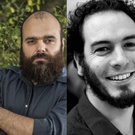Résidence en recherche artistique 2018.19
AI Swing! Analyser et Improvisation / Intelligence artificielle / Création et Interdisciplinarité.
En collaboration avec les équipes Représentations musicales et Analyse des pratiques musicales de l'Ircam-STMS.
Fruit d'une collaboration à long terme autour d'OMax, ce projet explore trois domaines principaux : Les possibilités d'analyse pour étendre les champs d'application et les paramètres ; l'utilisation ethno-musicale sur les archives et du matériel enregistré ; les aspects graphiques de la visualisation.
À partir de 2009, Raphaël Imbert et Benjamin Lévy ont joué avec OMax dans des situations très nombreuses et variées, du concert aux ateliers pédagogiques et conférences scientifiques. Notre curiosité pour la recherche scientifique, historique et musicale nous a permis de recueillir un grand nombre de retours d'expériences et d'idées à la fois pratiques et théoriques sur la manière de pousser plus loin le domaine de la co-improvisation avec ce système informatique. Dans ce projet nommé AI Swing!, nous avons organisé ces axes de recherche en trois thèmes principaux. Bien que le premier objectif était de générer de nouvelles interactions musicales, les principes d'Omax sont très puissants pour analyser les improvisations de n'importe quelle esthétique et de n'importe quelle époque. De plus, il est capable de fournir une visualisation et un usage créatif de ces analyses qui se révèlent très pertinents. Nous proposons de faire avancer ce sujet, de formaliser et d'améliorer la capacité d'analyse d'OMax et de ses successeurs vers un usage plus large et plus générique.
Grâce à la capacité d'analyse précédemment mentionnée d'OMax, à l'investigation de matériel musical historique comme les premiers enregistrements de Jazz solo, les archives d'anciennes prédications et beaucoup d'autres documents significatifs dans l'histoire musicale, nous pensons que la connaissance interne du système peut capter des traits essentiels de la structure musicale. Et nous souhaitons approfondir les aspects ethno-musicaux d'un tel outil notamment vers des objectifs historiques et pédagogiques.
Enfin, l'aspect visualisation d'OMax ne doit pas être sous-estimé à des fins artistiques, analytiques et pédagogiques. Après de nombreuses années de volonté et d'idées sur l'utilisation transdisciplinaire d'OMax, nous espérons développer les possibilités graphiques du système et le lier à différents arts et à différentes esthétiques. Comme OMax et sa famille d'outils ont émergé de l'équipe Représentations musicales de l'IRCAM et que nous avons gardé des liens avec cette équipe au fil des années, il est naturel d'apporter ce projet aux chercheurs de cette équipe. Cependant, les découvertes historiques et ethno-musicales que nous aimerions formaliser résonneraient particulièrement bien avec l'équipe Analyse des pratiques musicales et surtout avec le travail de Clément Canonne sur l'analyse de l'improvisation libre.
Raphaël Imbert et Benjamin Lévy
Biographies
Raphaël Imbert
Raphaël Imbert est né à Thiais le 2 juin 1974. Il apprend à jouer du saxophone à l'âge de quinze ans en autodidacte, puis entre au conservatoire de Marseille dans la classe de jazz de Philippe Renault. Il y obtient le Premier prix de Conservatoire en 1995 avec Jean-Jacques Elangué. Il fut lui-même assistant professeur dans la classe de jazz du conservatoire de Marseille de 2003 à 2006.
En 1996 il fonde les groupes Hemlé Orchestra et Atsas-Imbert Consort (Émile Atsas (guitare), Vincent Lafont (piano), et Jean-Luc Di Fraya (percussions)), avec lesquels il se produit notamment sur les scènes de Jazz à Vienne, Nice Jazz Festival, et la Fiesta des Suds à Marseille. Il crée à Marseille en 2002 avec des musiciens, sociologues, journalistes, mélomanes, le Collectif l’Enclencheur, à la vie éphémère, qui défend un projet de réflexion intégrant la pratique du jazz dans une vision de la société plus globale. En 2003, il est lauréat du programme « La Villa Médicis Hors les Murs » pour son travail de recherche sur la musique sacrée dans le jazz, réalisé pendant six mois à New York. Dès lors, ce séjour devient l'élément fondateur des compositions de Raphaël Imbert.
Raphaël Imbert développe un projet pédagogique qu’il met en pratique au conservatoire de Marseille depuis 2003, ainsi que dans de nombreux séminaires, tels que le festival Jazz à Cluny et la formation des arts de la rue de la Fai’art. Il propose en classe de maître une méthode d'improvisation pour ensembles de musique de chambre.
Suite au projet Bach - Coltrane avec le Quatuor Manfred et André Rossi, il collabore régulièrement avec de nombreux musiciens classiques : Chiara Banchini, Johan Farjot, Arnaud Thorette, Karol Beffa, Jean-Guihen Queyras, Pierre-Olivier Queyras, Geneviève Laurenceau...
Il est membre du Conseil d’administration de l’Orchestre national de jazz de septembre 2004 à septembre 2007 et remporte avec son groupe Newtopia Project le grand prix d'orchestre ainsi que le deuxième prix de soliste du 28e Concours national de jazz de la Défense en juin 2005. Il a composé pour le cinéma et la télévision pour les projets de Philippe Carrese et Isabelle Boni-Claverie.
Benjamin Lévy
Aujourd’hui réalisateur en informatique musicale à l’Ircam, Benjamin Lévy est issu d’une double formation supérieure en informatique et musique. Il entretient depuis 2008 une collaboration autant scientifique et technique qu’artistique avec plusieurs équipes de l’Ircam en particulier autour du logiciel d’improvisation OMax.
Comme ingénieur R&D et développeur, il travaille également au sein d’entreprises de technologies audio et créatives. En tant que musicien à l’ordinateur, son travail s’intègre à des projets artistiques variés dans la musique contemporaine, le jazz, l’improvisation libre, le théâtre, la danse. Il a collaboré notamment avec des chorégraphes tels qu’Aurélien Richard, dans le théâtre musical avec Benjamin Lazar et joue régulièrement avec le saxophoniste de jazz Raphaël Imbert.
